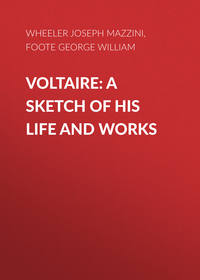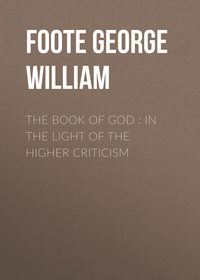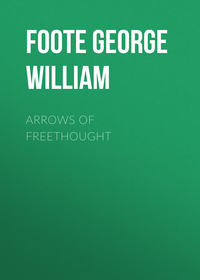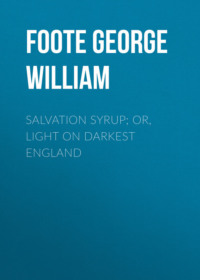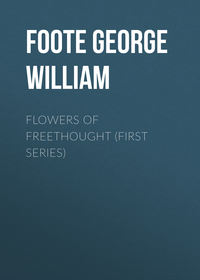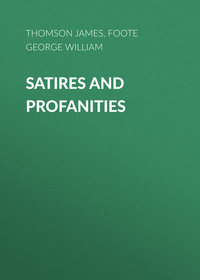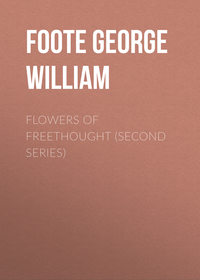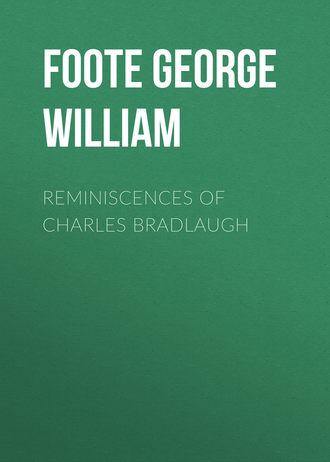 полная версия
полная версияReminiscences of Charles Bradlaugh
One day a gentleman called on him and was invited to take a chair. He sat down facing Mr. Bradlaugh, and explained that he wanted advice on a very particular matter. God Almighty had told him to kill someone, and he had a difficulty in selecting a victim. Mr. Bradlaugh put his hand behind him and quietly grasped the poker. The inspired gentleman put the problem as a knotty one, and begged the assistance of the clever Iconoclast. "Well," said Mr. Bradlaugh, keeping quite cool, "what do you say to the Archbishop of Canterbury?" "The very man!" exclaimed the inspired gentleman. He got Mr. Bradlaugh to give him the Archbishop's address, and said, "Good-day," with a profusion of thanks. Mr. Bradlaugh went to the door to look for a policeman, but none was visible, and the inspired gentleman was soon out of sight.
"So you see," said Mr. Bradlaugh, "It's good to have the poker handy. I never saw or heard of the man again, and I knew he couldn't get near the Archbishop. There are too many flunkeys in the way."
Those were my struggling days, and Mr. Bradlaugh was very kind to me. I remember the Sunday evening when I told him I thought of taking to the Freethought platform. He pointed out the hard and thorny path I should have to tread, but when he saw I was resolved on the attempt, he put his hand on my shoulder and said, "There is no young man in the movement I would sooner welcome."
In the very same room, on another Sunday evening a little later, I first saw James Thomson. He came down to the Hall of Science with Mr. Bradlaugh, in whose employment he then was, and I gave him the article I had brought for the National Reformer. He shook hands very cordially, and I was delighted to meet one for whose poetry I had a profound admiration.
It was also at the Hall of Science, about the same time, that I met the eccentric Mr. Turberville, brother to Mr. Blackmore, the novelist. He was a man of parts with a bee in his bonnet. He claimed kinship with Turberville, a minor poet of the sixteenth century, and he loved to talk of poetry. His knowledge of Shakespeare was profound and minute. He admired Mr. Bradlaugh's perorations immensely, as well as his bold defence of Freethought. He made out a will in Mr. Bradlaugh's favor, but he subsequently made another will, and died in circumstances that necessitated an inquest. By agreement, however, Mr. Bradlaugh obtained £2,500 from the estate, and the windfall came opportunely, for his struggles and litigations had involved him in considerable debt. I know he often had to borrow money on heavy interest. One day, at Turner-street, he told me that a creditor of this species had coolly invited him to dinner. "Hang it," he said, "you can't dine with a man who charges you sixty per cent."
Another recollection I have of Mr. Bradlaugh is in connexion with the funeral of Mr. Austin Holyoake. The death of this gentleman was a great loss to the Freethought cause. He was highly respected by all who knew him. The geniality of his disposition was such that he had many friends and not a single enemy. For some years he was Mr. Bradlaugh's printer and publisher, and a frequent contributor to his journal. He was foremost in every good work, but he was one of those modest men who never get the credit of their labors. He died at 17 Johnson's-court, Fleet-street, in an upstairs room above the printing office, where his devoted wife had for many weeks nursed his flickering life. The funeral was a notable event. Those of us who could afford it rode in the undertaker's coaches, and the rest walked in procession to Highgate Cemetery. I can still see Mr. Bradlaugh in my mind's eye, bustling about on the ground floor, taking everything as usual on his own shoulders. He sorted us in fours for the coaches, my vis à vis being James Thomson. At the graveside, after the reading of Austin Holyoake's own funeral service by Mr. Charles Watts, Mr. Bradlaugh delivered a brief address which he had written for the occasion. On the whole it was too much a composition, but one sentence was true "Bradlaugh," and it sounds in my ears still: – "Twenty years of friendship lie buried in that grave."
How such scenes are impressed on one's memory! As I write I see the set face of Charles Bradlaugh. I behold the sob-shaken back and bowed head of Herbert Gilham just in front of me. I hear and feel the cool, rustling wind, like a plaintive requiem over the dead.
Once again, years afterwards, I saw Mr. Bradlaugh in the same cemetery, supporting the helpless figure of Mrs. Ernestine Rose as she left the open grave of the dear partner of her long life of labor for the cause of human redemption.
Owing to circumstances, into which I need not enter, I saw little of Mr. Bradlaugh between 1875 and 1880. When he was returned for Northampton I rejoiced, and when he was committed to the Clock Tower I saw my duty sun-clear. It was to participate as I could, and might, in the struggle. My contributions to Mr. Bradlaugh's journal were resumed, and I spoke at meetings in his behalf. In May, 1881, I started the Freethinker, my oldest living child. Mr. Bradlaugh acted with his natural generosity. He advertised my bantling gratuitously in his own journal, and gave it every possible facility. This was not known at the time, but I ought to state it now.
Throughout that long, terrible struggle with the House of Commons I was with Mr. Bradlaugh on every point. If he made a single mistake I have yet to see it indicated. My article in the first number of the Freethinker was entitled "Mr. Bradlaugh's Advisers." Its object was to show the absurdity of the plentiful advice offered him, and the absolute justice of the course he was pursuing.
Three weeks afterwards the bigots convened a ticket meeting at Exeter Hall. The chief promoters were Earl Percy, Sir Bartle Frere, and butcher Varley. Mr. Bradlaugh was afraid the meeting would have a pre-judicial effect on public opinion in the provinces. The fact of the tickets would be kept back, and the report would go forth that a vote was unanimously passed against him at a big London demonstration. It was necessary, therefore, that the meeting should be spoiled. And it was. Mr. Bradlaugh gave me the task of moving an amendment. We had a chat in his library at St. John's Wood, and as we parted he said, "I rely on you, Foote." He looked at me steadily, holding my eyes as though to read the depths.
We got tickets somehow. But the Protestant Alliance smelt mischief, and Mr. Bradlaugh's supporters had to fight their way in. Two hundred and fifty police were not enough to keep them all out. I was naturally a marked man, and fighting had to be supplemented by diplomacy. When the noble Smithson (Earl Percy), had drivelled for a few minutes as chairman, and the resolution against Mr. Bradlaugh had been proposed and seconded by Sir John Kennaway and Canon Taylor, I rose to move an amendment. But the amendment was refused. The resolution was put, and the Christians stood up and voted, while the organ played "God Save the Queen." Then, at a signal, our people jumped on the forms, and rent the air with cheers for "Bradlaugh." At another signal they all trooped out, went off to Trafalgar-square with the big crowd outside, and passed resolutions in Mr. Bradlaugh's favor. The bigots' meeting was completely spoiled. They had to barricade the doors and keep out their own people as well as the enemy; the hall was never half full, and their resolution was passed after refusing an amendment, amidst loud execrations. Such a lesson was taught the bigots that they never made another attempt. Mr. Bradlaugh had trusty lieutenants and stern supporters, and the bigots knew he would spoil every private meeting that professed to be public. He acted with wisdom and determination, and the result showed he knew the stake he was playing for when he said, "I rely on you," with that steady Napoleonic look.
Mr. Bradlaugh's legal exploits, if properly recorded, would fill a good-sized volume. When his life is adequately written, as it will be some day, this department will have to be entrusted to a skilled lawyer. No other person could do anything like justice to a most important part of the career of one whom the Tories used to call "that litigious man," when they were trying to ruin him in the law courts and he was only defending himself against their base attacks.
Those who had only known Mr. Bradlaugh as a platform orator had some difficulty in recognising him when they first met him in one of our "halls of justice." His whole manner was changed. He was polite, insinuating, and deferential. His attitude towards the judges was admirably calculated to conciliate their favor. I do not mean that he calculated. He had quite a superstitious veneration for judges. It was perfectly sincere and it never wavered. He would not hear a word against them. When he pleaded before them his personal sentiments ran in a line with his best interests; for although judges are above most temptations, their vanity is often sensitive, and Mr. Bradlaugh's manner was intensely flattering.
Had he followed the legal profession, Mr. Bradlaugh would have easily mounted to the top and earned a tremendous income. I have heard some of the cleverest counsel of our time, but I never heard one to be compared with him in grasp, subtlety and agility. He could examine and cross-examine with consummate dexterity. In arguing points of law he had the tenacity of a bull-dog and the keenness of a sleuth-hound. He always fortified himself with a plethora of "cases." The table in front of him groaned with a weight of law. Here as elsewhere he was "thorough." An eminent jurisprudist once remarked to me, "there is little gleaning to be done after Bradlaugh."
As a pleader before juries, however, I doubt whether he would have achieved a great success. He was too much of a born orator. He began well, but he soon forgot the limited audience of twelve, and spoke to a wider circle. This is not the way to humor juries. They like to feel their own importance, and he succeeds best who plays upon their weakness. "Remember," their looks say, "you are talking to us; the other gentlemen listen accidentally; we make you or damn you."
My first recollection of Mr. Bradlaugh in the law courts is twenty-two years old. How many survivors are there of the friends who filled that dingy old court at Westminster where he argued before a full bench of judges in 1869? He was prosecuted for note giving sureties in the sum of £400 against the appearance of blasphemy or sedition in his paper. The law was resuscitated in his single case to crush him; but he fought, as he said he would, to the bitter end, and the Gladstone Government was glad to repeal the obsolete enactments. The Crown retired from the suit with a stet processus, and Mr. Bradlaugh was left with the laurels – and his costs.
I obtained an hour or two's leave from my employment, and heard a portion of Mr. Bradlaugh's argument It gave me a new conception of his powers. That is the only impression I retain. The details have dropped out of my memory, but there remains as fresh as ever the masterful figure of Charles Bradlaugh.
The best view I ever had of Mr. Bradlaugh in litigation was in the old Court of Queen's Bench on Tuesday and Wednesday, July 19 and 20, 1881, when he cross-examined poor Mr. Newdegate. For a good deal of the time I sat beside him, and could watch him closely as well as the case. By raising the point whether the writ against him for penalties had been issued before or after he gave his vote in the House, he-was able to put all the parties to the prosecution into-the witness-box and make them give an account of themselves. Mr. Newdegate was one of the victims, and the poor man made confessions that furnished Mr. Bradlaugh with ground for a successful action against him under the law of Maintenance. Mr. Newdegate was a hard-mouthed witness, but he-was saddled, bridled, and ridden to the winning-post. His lips opened literally, making his mouth like the slit of a pillar-box. Getting evidence from him was like extracting a rotten cork from the neck of a bottle but it all came out bit by bit, and the poor man must have left the witness-box feeling that he had delivered himself into the hands of that uncircumcised Philistine. His cross-examination lasted three hours. It was like flaying alive. Once or twice I felt qualms of pity for the old man, he was such an abject figure in the hands-of that terrible antagonist. Every card he held had to-be displayed. Finally he had to produce the bond of indemnity he had given the common informer Clarke against all the expenses he might incur in the suit; When this came out Mr. Bradlaugh bent down to me and said, "I have him." And he did have him. Despite the common notion that the old law of Maintenance was obsolete, Mr. Bradlaugh pursued him under it triumphantly, and instead of ruining "Bradlaugh," poor Newdegate was nearly ruined himself.
What a contrast to Mr. Newdegate was Mr. Bradlaugh! He was the very picture of suppressed fire, of rampant energies held in leash: the nerves of the face playing like the ripple on water, the whole frame quivering, and the eyes ablaze. It was wonderful how he managed to keep his intellect alert and his judgment steady. Six hours of such work as he had in court that day were enough to tax the greatest strength. Before it was over I saw bodeful blood-rims under his eyes. It did not surprise me, on meeting him at the Cobden Workmen's Club the next evening, to learn that he had been frightfully ill. "Mr. Bradlaugh," I wrote at the time, "is a wonderfully strong man, but the Tories and the bigots are doing their best to kill him, and if this sort of thing is to continue very much longer they may succeed." Alas, they did succeed. That terrible struggle killed him. No man ever lived who could have passed through it unbroken.
Mr. Bradlaugh was clearly right on the point raised, but the jury went against him, apparently out of sheer prejudice. When he went out into Westminster Hall he was loudly cheered by a crowd of sympathisers, who, as the Times sneered, "applauded as lustily as though their champion had won." Precisely so. Their applause would have greeted him in the worst defeat. He was not a champion on whom they had "put their money." He represented their principles, and the Times forgot, if it ever knew, that men are devoted to leaders in proportion to the depth of the interests they espouse. Conviction "bears it out even to the edge of doom."
Now let me mention something that shows Mr. Bradlaugh's tact and consideration. My work on the Freethinker brought me no return. I had just read the proof of an article for Mr. Bradlaugh's paper. While we were waiting for the jury's verdict he referred to the article, and guessing my need he said, "Shall I give you the guinea now?" My answer was an expressive shrug and a motion of the eye-brows.
Taking the two coins out of his pocket, he wrapt them in a piece of paper under the table, and presently slipped the packet into my hand. The whole proceeding touches me deeply as I recall it. He might well have thought only of himself in that time of suspense; but he thought of me too, and the precautions he took against being seen to pay me money were expressive of his inbred delicacy. Reader do not say the incident is trivial. These little things reveal the man.
Little did I dream, as I watched Mr. Bradlaugh fighting bigotry in the law courts, that the time would come when he and I would be included in a common indictment and stand in a criminal dock together. But as the French say, it is always the unexpected that happens. Early in July, 1882, I was served with a summons from the Lord Mayor of London, ordering me to appear at the Mansion House on the following Tuesday and take my trial on a charge of Blasphemy. Two other gentlemen were included in the summons, and all three of us duly appeared. We were all members of the National Secular Society, and Mr. Bradlaugh attended to render any possible assistance. The case was adjourned to the following Monday, by which time a summons had been served on Mr. Bradlaugh, who took his place beside us in the dock. After an animated day's proceedings we were committed for trial at the Old Bailey.
The object of this prosecution was, of course, to stab Mr. Bradlaugh in the back. He had fought all the bigots face to face, and held them all at bay; so they put a stiletto into Sir Hardinge Giffard's hands, and paid him his blood-money to attack the hero from behind.
Mr. Bradlaugh had to play the fox again. He wanted to gain time, and he wanted to be tried, if at all, in the Court of Queen's Bench. He always told me that being tried at the Old Bailey was going like a lamb to the slaughter, and that a verdict of guilty there would certainly mean twelve months' imprisonment. The obvious resource, therefore, was to obtain a writ of certiorari removing our indictment to the superior court. Happily it was in the long vacation, and application had to be made to a judge in chambers. By another piece of good luck, it was Mr. Justice Stephen who sat behind the table on the fatal morning when the writ had to be finally granted or refused. It was obtained on July 29, 1882. Poor Mr. Maloney, who represented the prosecution, was no match for Mr. Bradlaugh, who treated him like a child, and only let him say a word now and then as a special favor.
Roaming the law courts with Mr. Bradlaugh, I was able to see his intimate knowledge of legal practice. He threaded the labyrinth with consummate ease and dexterity. We went from office to office, where everything seemed designed to baffle suitors conducting their own cases. Our case, too, was somewhat peculiar; obsolete technicalities, only half intelligible even to experts, met us at every turn; and when we got out into the open air I felt that the thing was indeed done, but that it would puzzle omniscience to do it in exactly the same way again. Seven pounds was spent on stamps, documents, and other items, and securities for costs had to be given to the extent of six hundred pounds. As I walked home I pondered the great truth that England is a free country. I had seen with my own eyes that there is one law for rich and poor. But I could not help reflecting that only the rich could afford it, and that the poor might as well have no law at all.
Mr. Bradlaugh next moved to quash the indictment. He argued that the public prosecutor's fiat was bad, as it did not name the persons who were to be proceeded against, and thus resembled a general warrant, which in the famous Wilkes case the judges had held to be invalid. On this point, however, two judges, one of them being Sir James Stephen, gave judgment against him. The case was argued on Mr. Bradlaugh's part, the judges said, with "great power and learning." For my part, I think he showed a greater knowledge of "cases" than both the legal luminaries on the bench, who laid their heads close together over many a knotty point of the argument.
Beaten on the main issue, Mr. Bradlaugh was successful, however, on the subsidiary one. Two counts were struck out of the indictment. The excision made no difference to me, but a great deal of difference to him. Two numbers of the Freethinker were thus disposed of bearing the imprint of the Freethought Publishing Company – under which name Mr. Bradlaugh and Mrs. Beasant traded – and owing to the lapse of time it was impossible to open a fresh indictment. Of course I saw what Mr. Bradlaugh was driving at, and I could not but admire the way in which he made light of this point, arguing it baldly as a formal matter on which, as their lordships would see at a glance, he was absolutely entitled to a judgment. They would see that he was still open to all the other counts of the indictment, and therefore it might make very little difference, but right was right and law was law. Under the spell of his persuasive speech, it was amazing to see the judges smoothing their wrinkled fronts. I fancy they gave him his second point the more readily because they were against him on the first; indeed, they seemed to think it a pity, if not a shame, that all his learning and ability should be displayed for nothing.
Our indictment went into the list of Crown Cases Reserved, and did not come on for trial till the following April. Meanwhile I was prosecuted again, and failing to get a writ of certiorari, owing to the flagrant bigotry of Baron Huddleston and Justice North, I was tried at the Old Bailey, and sentenced to twelve months' imprisonment like a common thief – as Mr. Bradlaugh had predicted.
During my trouble Mr. Bradlaugh lent me every assistance, furnishing me with legal books and advice and visiting me in Newgate between the first and second trials, while Judge North's underlings were preparing a more pliant jury than the one which had declined to return a verdict of guilty.
In Holloway Gaol I lost sight of Mr. Bradlaugh and everyone else, except persons I had no desire to see. But one morning, early in April, 1883, the Governor informed me that Mr. Bradlaugh was going to pay me a visit, having the Home Secretary's order to see me on urgent business. The same afternoon I was marched from my cell into one of the Governor's offices, where Mr. Bradlaugh was wailing. Compared with the pale prisoners I saw day by day, he looked the very picture of health. Fresh, clean-shaven, neatly dressed, he was a most refreshing sight to eyes accustomed to rough faces and the brown convict's garb. And it was a friend too, and I could take his hand and exchange human speech with him. How vivid is my recollection of him at that moment! He seemed in the prime of life, little the worse for his terrible struggles, only the gray a trifle more decided about the temples, but the eyes full of light, and the mobile mouth full of vitality. And now he is dead! Dead! It is hard to realise. But I rang the muffled bell as he lay fighting his last battle, and I followed his corpse to the grave; and I know that the worm is busy about those leonine features, and the rain trickles through with a scent of faded flowers. Yes, it is true; he is dead. Dead like the king and dead like the clown; yet living truly beyond the dust of death in the lives of others, an inextinguishable light, a vivifying fire, a passionate hope, an ardent aspiration.
Till the Future dares
Forget the Past, his fate and fame shall be
An echo and a light unto eternity.
On the morning of April 10, 1883, I put on my own clothes and was driven in a four-wheeler from Holloway Gaol to the Law Courts, in company with Warder Smith, who superintended the wing of the prison in which a grateful country lodged and boarded me at its own expense. It was lovely spring weather, and I felt like a man new-born.
Inside the court where the great Blasphemy case was to be tried I found Mr. Bradlaugh with his usual load of law books. The court was crowded with friends of the defendants and legal gentlemen anxious to witness the performance.
Mr. Bradlaugh applied for a separate trial, on the ground that as there was no charge of conspiracy it was unjust to prejudice his case by evidence admitted against his co-defendants; and Lord Coleridge, who obviously meant to see fair play, granted the application.
Mr. Bradlaugh's position was, in one sense, the most perilous he had ever stood in. Just as his long litigation with respect to his seat in Parliament was drawing to a close, and as he believed to a successful close, he had to defend himself against a charge which, if he were proved guilty, would entail upon him the penalty of imprisonment. Of course it would not have been such imprisonment as I was suffering, for Queen's Bench prisoners are generally sent to the civil side of Holloway Gaol. But any imprisonment at such a moment gravely imperilled his prospects of success in the mighty struggle with wealth, bigotry, and political prejudice. A sense of this fact weighed heavily upon him, but it did not impair his energy or intellectual alertness; indeed, he was one of those rare men whose faculties are sharpened by danger.
I need not dwell upon the evidence of the prosecution. It was most unsatisfactory, and failed to connect Mr. Bradlaugh with the Freethinker. Sir Hardinge Giffard, therefore, almost entirely confined himself to playing upon the prejudices of the jury.
Mr. Bradlaugh was perfection itself in examining and cross-examining, and was soon on the windward side of the judge, but his address to the jury was too boisterous. He felt too much. His adversary was not under this disadvantage, and Sir Hardinge Giffard's address to the jury, considered merely as a tactical display, was better than Mr. Bradlaugh's.


